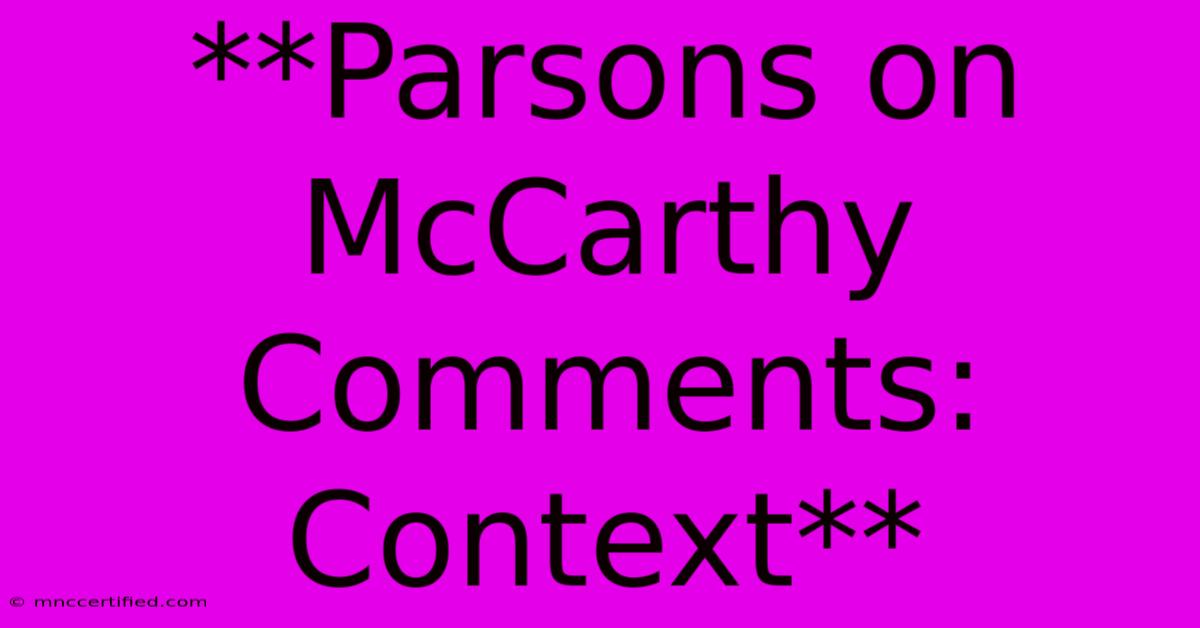**Parsons On McCarthy Comments: Context**

Table of Contents
Parsons on McCarthy Comments: Context and Controversy
The recent comments by Republican candidate for the United States Senate, Blake Masters, about the 1950s Red Scare and Senator Joseph McCarthy have sparked significant controversy. Masters, a prominent figure in the tech industry, was criticized for his seemingly sympathetic stance towards McCarthy, a figure synonymous with political persecution and the suppression of free speech. To understand the context and gravity of Masters' remarks, it's crucial to delve into the historical significance of McCarthyism and its lasting impact on American society.
McCarthyism: A Dark Chapter in American History
Senator Joseph McCarthy, a Republican from Wisconsin, rose to notoriety in the early 1950s for his relentless accusations of communist infiltration in the American government and institutions. His tactics were marked by baseless accusations, unsubstantiated claims, and a disregard for due process. McCarthy's investigations, often conducted through televised hearings, fueled public fear and paranoia, leading to the blacklisting of individuals suspected of communist sympathies, the loss of jobs, and the erosion of civil liberties.
Parsons' Comments: A Defense of McCarthy's Methods?
Masters' remarks, made during a campaign event in Arizona, sparked outrage among many observers. While he acknowledged that McCarthy "went too far," Masters seemed to suggest that the Senator was ultimately "right" about the communist threat. This implied support for McCarthy's tactics, even while condemning their excesses, raised concerns about Masters' commitment to democratic principles and his understanding of the damage caused by McCarthyism.
The Impact of McCarthyism: Beyond the 1950s
The legacy of McCarthyism extends far beyond the 1950s. The chilling effect on free speech and the culture of fear it created had a lasting impact on American society. The period fostered suspicion and distrust, leading to the suppression of dissenting voices and the erosion of academic freedom. McCarthyism's impact can still be seen in contemporary debates around political correctness, cancel culture, and the role of government in protecting individual liberties.
Conclusion: Navigating the Past and Present
Masters' comments highlight the ongoing relevance of McCarthyism in the American political landscape. His seemingly sympathetic stance towards McCarthy raises questions about the candidate's understanding of history and his commitment to safeguarding civil liberties. It's crucial for voters to engage in informed discussions about the historical context of McCarthyism and its implications for the future of American democracy. By acknowledging the harmful legacy of McCarthy's tactics and upholding democratic principles, we can strive to prevent a repetition of the dark chapter in American history.
Keywords: Parsons, McCarthy, Red Scare, McCarthyism, American history, civil liberties, free speech, political persecution, due process, blacklisting, fear, paranoia, democratic principles, context, controversy.

Thank you for visiting our website wich cover about **Parsons On McCarthy Comments: Context**. We hope the information provided has been useful to you. Feel free to contact us if you have any questions or need further assistance. See you next time and dont miss to bookmark.
Featured Posts
-
Wall Street Up Bitcoin Rises Today
Nov 12, 2024
-
Investment Banking Valuation Methods
Nov 12, 2024
-
Tesla Stock Gains Momentum After Election
Nov 12, 2024
-
Ohio Casualty Insurance Phone Number
Nov 12, 2024
-
Who Accepts Lincoln Vision Insurance
Nov 12, 2024